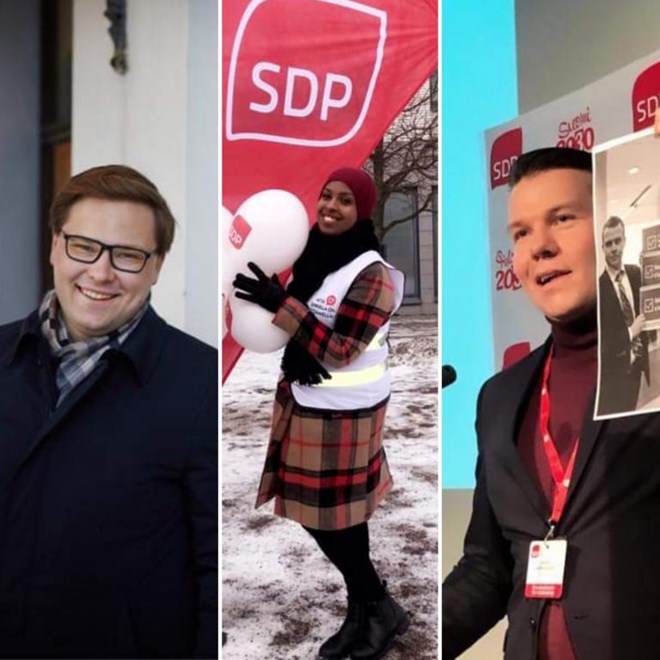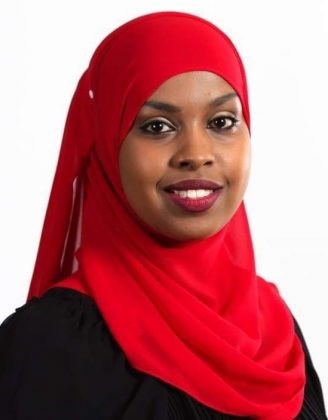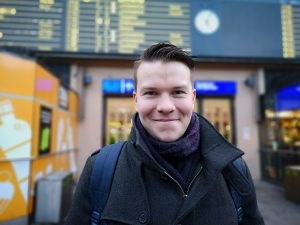News Now Finland
Monday February 25, 2019
By David Mac Dougall

Composite picture of minority background candidates / Credit: Candidates' Facebook
Many younger candidates who come from minority backgrounds are hoping to break through to national politics in the spring elections.
With campaigning well underway for spring elections, a slew of candidates with minority backgrounds are hoping to win enough votes to get into office, a sign perhaps that Finland’s parliament might more closely resemble the increasingly diverse constituents it represents.
At present only two out of 200 MPs have minority backgrounds (not counting linguistic and cultural minority Swedish-speaking Finns) and they’re both from the Greens. Jani Toivola will step down at April’s general election, while Ozan Yanar is hoping to be re-elected for a second term.
This year most of the main parties – but especially those on the left – are fielding candidates with minority backgrounds, particularly in the capital city region where the Helsinki City Council is already the most diverse elected body in the country.
The Somali immigrant

Official picture of Habiba Ali (SDP) / Credit: Candidate
On a stall at an Espoo shopping centre on a cold February morning, Habiba Ali (SDP) knows she stands out from the other candidates canvassing for votes.
“They see this immigrant background woman wearing the hijab. I’m an immigrant, I’m black, I’m Muslim, I’m a woman. I can be all those things!” she exclaims.
“Some people who come and talk to me, they only have questions regarding immigrants, and they think I can only talk about immigrants” says the Somali-born politician who moved to Finland as a young child, and already broke ground by winning a seat on the Espoo city council in 2017.
“Some people are rude and say they will never vote for immigrants. Or SDP. And some are very polite and want to see many different types of Finns in parliament” she tells News Now Finland.
Ali sees the rising interest in politics from Finns with minority backgrounds, and thinks it’s a reflection of the way society has been dealing with immigrant issues in recent years.
“This year there are so many minority candidates running for elections, especially these parliament elections. And I think it’s because of the times we are living. People are waking up. They are fed up. There is a lot of polarization going on, and we are living in difficult time” she explains.
Although Habiba Ali is sadly no stranger to getting nasty emails or comments on social media, she says that on the campaign trail it’s more polite. Anyone who disagrees with her, or her politics, is unlikely even to come and take a flyer at the stall.
But for those who do want to engage in conversation, she’s there to try and change some of their pre-conceived ideas.
Common arguments are that immigrants are taking more than their fair share of resources in Finland. Or that the health care is bad because of immigrants. Or that elderly care is in disarray because resources are being spent on asylum seekers instead.
“I tell them, we can take care of everyone! We don’t have to choose between young people, or old people, or asylum seekers” says Ali.
“The parliament is not representing the people of Finland if it is only representing the white people. It’s really good for our youth to have role models, and I am worried the way Finland is going if we don’t have any more immigrant background people after the election. It is sending a message that Finland is not ready” she says.
“It’s a strong message we are giving. We are different kinds of people, but we are all Finns”.
The Ingrian minority

Picture of (L-R) Daniel Sazonov (NCP) with Party Chairman Petteri Orpo (NCP) / Credit: Candidate’s FB
One of the crop of Helsinki councilors running for parliament this year is 26-year old Daniel Sazonov (NCP).
“I think as Finland becomes more diverse from year to year, it underlines the importance of different backgrounds” says Sazonov, who works as an adviser to the Minister of Education.
Sazanov is an Ingrian-Finn, part of the country’s Russian-speaking minority. Although his parents moved here from the Soviet Union in the 1990s, he was born in Finland.
“I don’t myself feel that just because I’m a person with a minority background that I only represent that minority, or group of people, but it certainly brings a really important perspective to the discussion” he tells News Now Finland.
Sazanov says that when it comes to Finnish politics there’s a lot of diversity of opinions in the Ingrian community, with Russian-speakers involved in different political parties. But now he sees a new crop of young politicians with different minority backgrounds rising through the well-trodden path of Finnish politics from involvement in youth politics to local government and often on to parliament.
“Perhaps now so much time has passed that we have people like me born here, I understand the Russian-speaking minority people what they are thinking and their troubles and so on, but I have the classic Finnish route. First active in youth politics and the city council” Sazanov tells News Now Finland.
“If i look at the city council for example, and I look at those who come from some minority background, they have the same kind of regular Finnish political path as I do, and now is the time, they’re that age where they’re ready to run on the national level” he explains.
The Sámi candidate

File picture of Mikkel Näkkäläjärvi (SDP) / Credit: News Now Finland
Looking beyond the general election in April, the European Parliament elections are coming up just six weeks later at the end of May.
Social Democrat Mikkel Näkkäläjärvi is hoping to become the first indigenous person elected to the European Parliament in Brussels.
There’s been a dearth of Sámi politicians in the national parliament as well, with Heikki Autto (NCP) and Janne Seurujärvi (Centre) the only Sámi MPs in recent memory.
“One reason is maybe some [Sámi] people haven’t that active in the Finnish political systems. Many Sámi people who are active in politics, they are active in Sámi politics, in the Sámi parliament elections, and the Nordic Sámi cooperation and in the United Nations and in international level, but not in Finnish politics. Not at local level, or in national politics” explains the 29-year old chair of the Social Democrat youth organisation.
Näkkäläjärvi says it would be important for Sámi to be involved in different political parties at national level, because it’s a way to bring influence on policies which impact Sámi people. But he also predicts a sea-change in parliament in the coming years when it comes to wider minority representation.
“I believe that in 20 years, the situation is much better in Finnish politics when it comes to the representation of all minorities in Finland like Romas, Russian-background minorities, Somalis, people who have come to Finland as a refugee” he tells News Now Finland.
“I feel it’s the best idea of a representative democracy, that you choose people to make decisions, and the people who are decision makers, they should represent all the people"